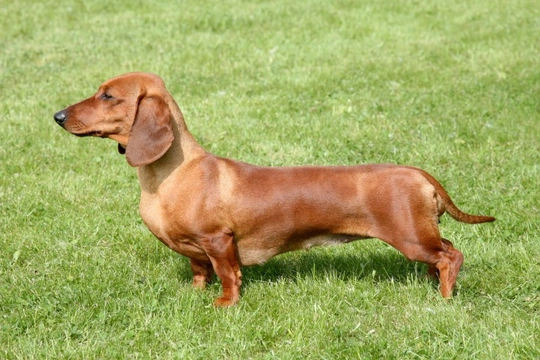
Dachshund Frequently Asked Questions
Dachshunds are among some of the most popular companions and family pets in the UK. They are affectionately called “sausage dogs” thanks to their long backs and short legs. They are highly intelligent and love being in a home environment which means that in the right hands, they are easy to train. If you are thinking about getting a Dachshund and would like to know a little more about the breed, the frequently asked questions below may help you make up your mind.
What’s the life span of a dachshund?
Being small dogs, Dachshunds can live anything from 12 to 13 years if they are well cared for and fed an appropriate diet to suit the different stages of their lives. However, it’s really important not to let Dachshund puppies jump up on furniture or go up and down stairs or get in and out of cars on their own because it puts too much pressure on their growing joints and their spines which could lead to a Dachshund suffering from serious health issues later in their lives.
How much does it a dachshund puppy cost?
Dachshunds are one of the most popular breeds in the UK (and elsewhere in the world) and according to Pets4Homes statistics, a well-bredKennel Club registered Dachshund puppy can cost up to £1,291. A non-Kennel Club registered Dachshund puppy can still command a lot of money which can be anything up to just under £900. With this said, anyone thinking about getting a Dachshund puppy should always contact responsible breeders who take great care when choosing their stud dogs. This ensures that puppies are less at risk of inheriting any hereditary or congenital health disorders that Dachshunds are known to suffer from.
Do Dachshunds make good family pets?
Dachshunds generally make wonderful pets, but there have been reports of some dogs being aggressive towards people they don’t know and towards other dogs. They are loyal and affectionate towards their families and even though small in stature, Dachshunds make wonderful watchdogs. They are also good around well-behaved children who respect them. It is worth noting that some breed enthusiasts believe that different types of Dachshunds show different personalities.
Are Dachshunds aggressive by nature?
Dachshunds are feisty by nature and will stand their ground when needed. Aggression should be gently nipped in the bud when dogs are still young so they understand that it’s not acceptable behaviour although it can be hard to prevent a Dachshund from being aggressive towards other dogs.
Do Dachshunds shed a lot?
Dachshunds whether they have wirehair, longhair or shorthair coats shed continuously throughout the year although wirehairs shed slightly less. Like other breeds, they also shed the most during the spring and the autumn when more frequently grooming is necessary to stay on top of things and to prevent hair being left all over the house.
Are Dachshunds good around children?
Providing children respect a Dachshund and treat them nicely, they are good around kids. However, although they are tolerant of children in their family, Dachshunds may not be quite as nice towards children they don’t know. As such, any interaction between dogs and children should always be well supervised to prevent anything from happening whether it’s the kids teasing a dog or a Dachshund showing aggressive behaviour towards the children.
Can Dachshunds swim?
Dachshunds are not very good swimmers thanks to their short legs and build. As such, care should always be taken when they are around water just in case they fall in and need rescuing.
Why do Dachshunds burrow under blankets?
According to dog behavioural experts, Dachshunds are known to be “denning” characters by nature. This means they like to feel safe when they sleep and being under a blanket is like being in a “den” which provides them with the sort of protection they like to have when they are napping.
Do Dachshunds bark?
Dachshunds like the sound of their own voices and because they were bred to hunt, it is in their nature to “bark” and for such small dogs, they have remarkably loud voices. They are also extremely sensitive to everything that goes on around them which can also stimulate them to bark excessively.
What does Dachshund mean?
The breed’s name “Dachshund” is German for “Badger Dog” with the “Dachs” being badger and “hund” being dog.
Are stairs bad for Dachshunds?
Jumping up and down from furniture or in and out of cars as well as going up and down stairs, puts a lot of pressure on a Dachshund’s long back and it could lead to them suffering from a condition known as IVDD. As such, owners should always carry Dachshunds up and down stairs and should always lift them into cars and onto furniture.
Why does my Dachshund have such bad breath?
Bad breath can be caused by many things but the most common reason is because a Dachshund has some kind of dental issue or they have developed a gum disease. Plaque and tartar can be the culprits but should a Dachshund’s breath continue to be bad even though their teeth have been cleaned, then it’s time to have a dog checked over by a vet to see if there’s a respiratory issue or some other underlying cause for their smelly breath.



